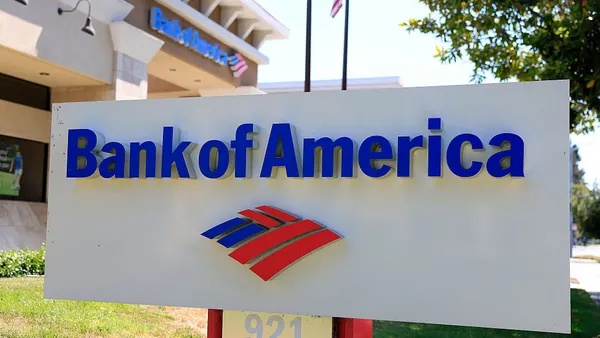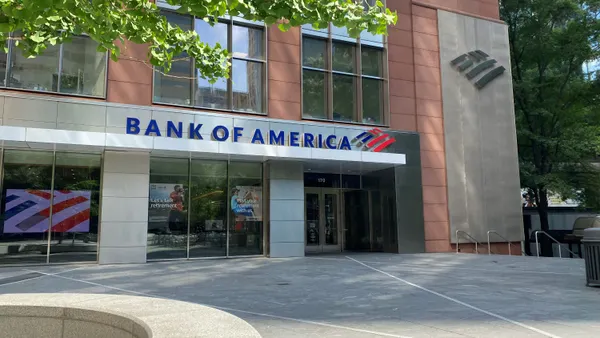Dive Brief:
- Consumer Financial Protection Bureau (CFPB) Director Kathy Kraninger resigned, effective Wednesday, at the request of President Joe Biden. The move came less than an hour after Biden's inauguration.
- Biden appointed nine-year CFPB veteran Dave Uejio, who last served as the bureau's chief strategy officer, as the agency's acting chief, the White House announced Thursday, according to Reuters. Biden announced Monday he intended to nominate Federal Trade Commission (FTC) Commissioner Rohit Chopra to a five-year term as the bureau's director. Chopra previously served as the CFPB's student loan ombudsman.
- The CFPB saw a marked downturn in enforcement under Kraninger, collecting about $1.5 billion in consumer redress over her two years at the agency, compared with $12 billion over the bureau's five years under Obama appointee Richard Cordray, according to Bloomberg Law.
Dive Insight:
Kraninger's term would not have ended until December 2023. However, Biden was expected to fire her if she did not resign — a prospect reinforced in June by a Supreme Court ruling that the president can fire the CFPB director "at will."
In her resignation letter to Biden on Wednesday, Kraninger wrote, "I support the Constitutional prerogative of the president to appoint senior officials within the government who support the president's policy priorities, which ensures our government is responsive to the will of the people as expressed in presidential elections."
Before the June ruling, the bureau's leadership could only be removed "for cause," a policy that prompted Seila Law, a California debt collection law firm, to argue it didn't have to comply with a CFPB civil investigative demand because the bureau's structure violated the Constitution's separation-of-powers rule.
Kraninger shifted her stance in the "at will"/"for cause" debate as the court fight gained steam, which won her no friends among Democrats in Congress. During her 2018 nomination process, Kraninger said, "the ultimate question of the constitutionality of the Bureau's structure is one for Congress or the courts to resolve." But when then-Solicitor General Noel Francisco urged the Supreme Court, in a September 2019 brief, to take the Seila Law case, he wrote "the Director has reconsidered that position."
The reversal led Sen. Sherrod Brown, D-OH, to "question [Kraninger's] credibility."
Kraninger, at that time, blamed the case for the CFPB's slump in enforcement. "Litigation over [the CFPB's constitutionality] has caused significant delays to some of our enforcement and regulatory actions," she wrote in a September 2019 email to staff. "I believe this dynamic will not change until the constitutional question is resolved either by Congress or the Supreme Court."
During her two years at the CFPB's helm, the bureau issued a final rule expanding the methods by which debt collectors can contact borrowers to include voicemail, email and text messages, but restricted the number of times a collector can call a consumer about a particular debt.
Another final rule in May slashed the number of mortgage lenders that must report loan application data used in fair lending enforcement, a move that prompted housing advocates to sue.
Kraninger also lifted a bureau hiring freeze put in place by her predecessor, former Acting Director Mick Mulvaney, and left public a consumer complaint portal.
In a particularly polarizing move, the Kraninger-led CFPB in July removed the "ability-to-repay" portion of a 2017 payday lending rule. Those provisions would have limited the number of consecutive, short-term loans a borrower could take out, and would have required lenders to verify borrowers' income. The bureau, however, let stand a measure to keep lenders from trying to withdraw funds from a borrower's bank account after two consecutive failed attempts.
The payday lending rule — and particularly its timing amid the coronavirus's early days — drew partisan rebukes.
"Your leadership has been a miserable failure," Sen. Elizabeth Warren, D-MA, an architect of the CFPB, told Kraninger during a Senate panel hearing in July. "Based on your actions in this pandemic, you should resign."
Referencing what he characterized as Kraninger's ability to dodge questions, Sen. Jon Tester, D-MT, called hearings with the now-former bureau director "a total waste of time."
Kraninger has elicited a history of Democratic rancor. House Democrats in 2019 leveled a blistering 333-page report at her, accusing her of going against the advice of her employees and "leaving consumers high and dry" because the CFPB didn't require remediation during a number of settlements.
"If you're not following direction from your staff to help consumers that are harmed, then you are absolutely worthless," Rep. Carolyn Maloney, D-NY, said in October 2019. "If the consumer bureau can't get relief for consumers who have been harmed — and you admit they've been harmed — then what are you doing?"
Before running the CFPB, Kraninger oversaw budgets for executive branch agencies at the Office of Management and Budget (OMB) and previously worked in the Department of Homeland Security. Despite her lack of banking industry experience, "she turned out to be a quick study," Alan Kaplinsky, senior counsel at Ballard Spahr, told Bloomberg Law. "As her term wore on, it became clear to the industry that she was not going to be a pushover in terms of her attitude toward compliance."
Ashley Harrington, federal advocacy director at the Center for Responsible Lending, told the publication, however, that "during the current crisis, she has really let a bunch of industry actors off the hook."
Kraninger has left more than 100 open investigations for her successors to pursue, Bloomberg Law reported.
"Throughout my career, I have focused on implementing common-sense solutions to complex problems and delivering real value for the American people," Kraninger wrote in her letter Wednesday. "I hope that my legacy will be the maturation of the CFPB itself and its role within the financial services regulatory framework."










